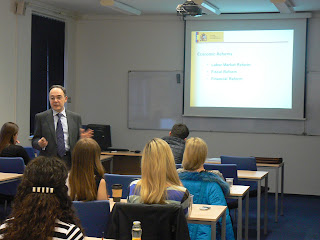Ambassador offers assurances at UNYP lecture
By Marie Ryan
“We cannot deny that Spain has economic difficulties. We recently have a perspective of a
negative growth of 1.7%, and with two terms of negative growth, we are now in a
recession,” said Pascual Ignacio Navarro Ríos,
Ambassador of the Kingdom of Spain to the Czech Republic.
Ríos made this statement at the UNYP Pulse Lecture on April 24, which
was attended by more than 30 students. Rather than avoiding the seriousness of
Spain’s financial situation, the ambassador focused on the rationale behind
current government reforms, as well as thoroughly explaining what these reforms
will change.
The factors that caused Spain’s economic downfall include a housing
market crash in 2009. Before the crash,
the construction sector accounted for approximately 13% of Spanish
employment. The construction slowdown
caused construction companies to go bankrupt, and many banks had to merge or
were rescued by the Spanish government.
As investor confidence in the economy has fallen, unemployment continues
to rise, as do unemployment benefits.
Despite these critical times, Ríos was hopeful because his government
is acting drastically to improve the situation through important reforms. He
mentioned three measures focused on the labor market, fiscal and financial
policies. Among other things, the new reforms allow for worker dismissals due
to economic and productivity reasons; funding to retrain the current unemployed
workforce; legal sanctions against regional fiscal incompetence, and salary reduction of bank executives by 70%.
Among the most important changes to improve the situation, compulsory
agreements between trade unions and industry unions will no longer be the
golden rule. “Trade unions and the business/ industry unions had the
opportunity to decide all the conditions – for example, wages, licenses, permits and everything were
decided in national agreements,” Ríos explained. “Traditionally, the bargaining
system meant a raise in the salaries of workers, even if the competitiveness of
the company had not risen. The objective of the reform is to change all of
that.
“Fair dismissal can be done for economic reasons now, which were
forbidden before,” he continued. “So if a company is in a difficult economic
situation, it can dismiss its workers with 20 days of notice. This is more or
less the European average.”
However, the degree to which these reforms will help increase
investors’ confidence in Spain is debatable. Unfortunately, in the days
following Ríos’ visit to UNYP, the credit rating agency Standard & Poor’s
downgraded Spain from A to BBB+. Although the country’s public debt is modest –
Spain actually has one of the lowest public debts in Europe, with past debt
levels reaching 60% of GDP, and present levels approximately 70% of GDP –
private debt is extremely high, due to all the losses banks suffered in the
collapse of the real estate market.
Standard & Poor’s considers the likelihood of Spanish banks being
rescued by the government to be high. Even if Spain’s public debt is low at the
moment compared to the rest of Europe, a high private debt coupled with growing
unemployment is alarming for an economy which depends on internal consumption.
Recent unemployment rates skyrocketed to 24%, with unemployment of people
between 25 and 35 reaching 45%. Standard & Poor’s could revise the negative
outlook to stable if the need for external financing decreases significantly,
and Spain’s economic growth prospects improve.
During the lecture, Ríos reassured students that Spain has the
resources to refinance itself. “Most of the Spanish banks have the possibility
to finance debt by themselves through a common factor, without help from
savings banks in Austria or Germany,” he said. This common factor is in fact a
common fund Spain has maintained for a long time, in order to prevent default
of the banks.
Whether or not Spain can turn its economic situation around with this
common fund and without borrowing money from a European financial institution
is arguable. Since Standard & Poor’s does not view the European Central
Bank’s recent long-term repurchase operations (LTROs) as a substitute for
financial sector restructuring and economic rebalancing, it may not consider
Spain’s common fund as the long-term answer to its crisis.
Regarding financial sector restructuring, reforms taken by the Spanish
government now encourage unstable banks to merge with stable ones. This
consolidation of the banking sector was also used by the United States in its response
to the financial crisis.
During the lecture, the ambassador’s tone was not overly optimistic.
“The structural measures to overcome the situation might succeed or not,” he
admitted. “It depends on us. And it depends also on the attitude and behavior
of the markets, and other colleagues in the European Union.”
“Do you have a plan B?” one student asked during the question period,
to which Ríos responded, “You cannot have a plan B, because this is the only
way to overcome the crisis. If not, we have to re-change everything.”


No comments:
Post a Comment